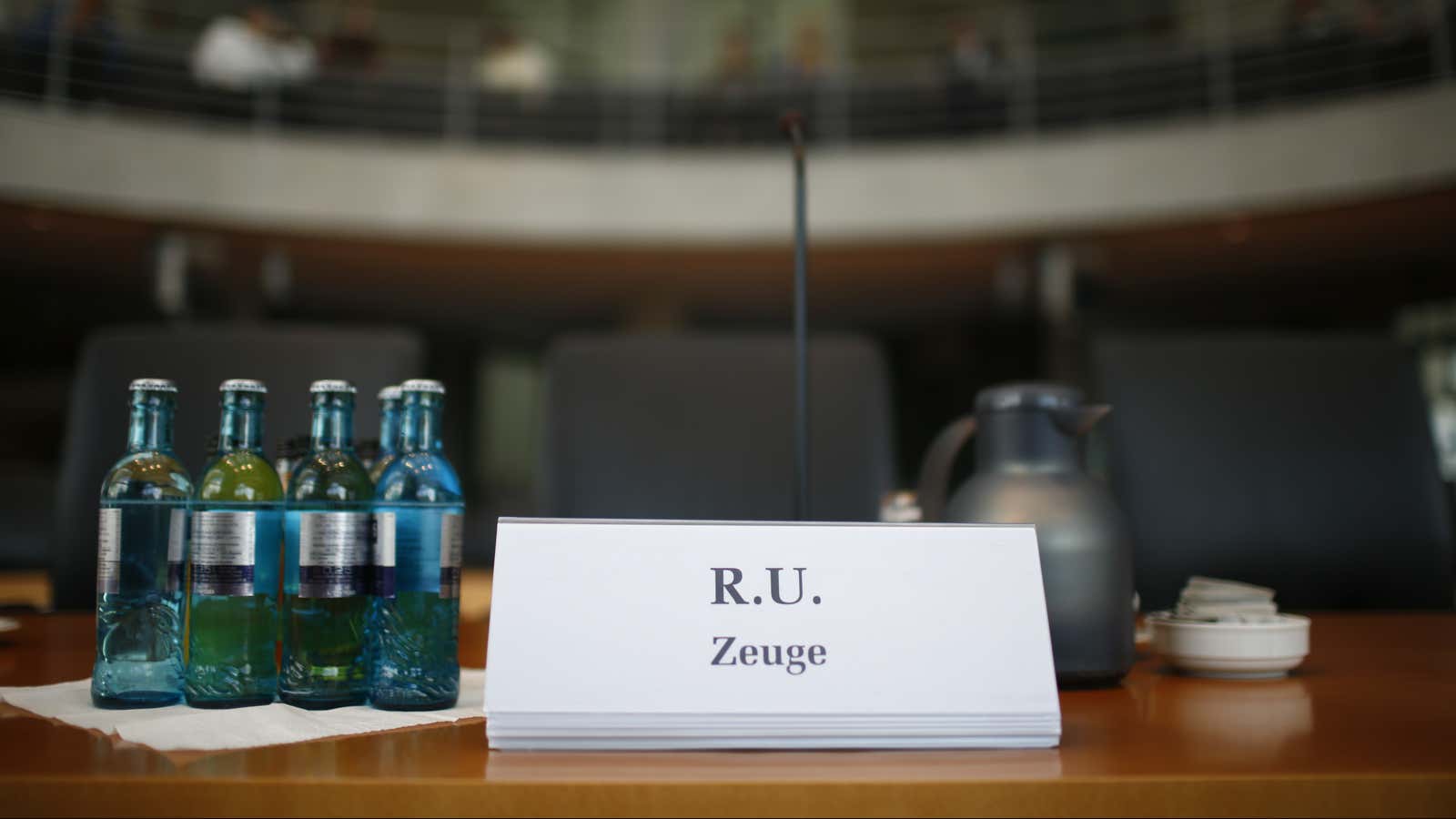The U.S. House has voted to strike the section of the Patriot Act that allows mass collection of Americans’ phone metadata, a week after the federal appeals court ruling that the dragnet wasn’t legal anyway. Amid the progress, Germans are still processing what exactly the National Security Agency has been up to on the continent. On May 12, Wikileaks released 1,380 pages of documents from the German Bundestag’s committee hearings on the NSA’s collaboration with the Bundesnachrichtendienst (BND).
The documents include interviews with senior staff of the BND, NSA, Deutsche Telekom and other agencies—some of the hearings were public, but no transcripts were going to be made available until the end of the investigation, which has already lasted one year. The Süddeutsche Zeitung reports that Bundestag’s NSA committee chair Patrick Sensburg is worried that the transcripts will hamper the ongoing inquiry, and Hans-Georg Maaßen, head of Germany’s domestic security agency, said he would pursue a criminal investigation.
Zeit Online reported that the BND forwards up to 1.3 billion metadata records to the NSA every month, without knowledge how the information is used. And according to records obtained by Zeit Online, in August 2013, the BND did not plan to limit the Signal Intelligence delivery to the NSA whatsoever. “This proves again, how willing the Germans are to let themselves be locked in to monitoring everything and everyone,” writes Kai Biermann.
Süddeutsche Zeitung also reported that the “no-spy agreement” between the USA and Germany was a figment of Chancellor Angela Merkel’s 2013 campaign. The newspaper released emails between a senior German official and the White House last week that showed repeated attempts to arrange and ensure that German law would be respected on German land. White House officials promised very little, yet Merkel’s spokesman reported that there would be a no-spy agreement. A few months later, it turns out Merkel’s cell phone was being monitored, and the spokesman maintains that he spoke the truth to the best of his knowledge at the time.
In the print edition of Die Zeit, Mariam Lau proposed that when it comes to the Americans’ spying activities the German government didn’t as much lie to the people as to itself. Merkel and her associates simply could not believe that their most important ally would leave them hanging in such a delicate situation.
Tabloid Bild says the NSA is not Germany’s enemy but its best protection against terrorism. The intelligence coming from the US is the best in the world, and German politicians cannot risk turning it down, writes Julian Reichelt. When the NSA spies on German companies, they often have a good reason for it—not to steal the newest automobile designs from Volkswagen but to determine whether any sanctions are being broken. The Frankfurter Allgemeine Zeitung says the BND affair has gone haywire: It is no longer clear what is forbidden or allowed, right or wrong, bad or good.
A few days earlier, The Economist’s Edward Lucas wrote for Bild a commentary titled “Dear Germans, you are spied on, get over it!” The United States is understandably interested in Germany’s relationships with China, Russia and Iran, but “the idea that the CIA is the intelligence arm of corporate America is a left-wing fantasy,” Lucas writes. “Germans cannot have everything. If they want to stay safe and free, then they must accept intelligence cooperation with their biggest and most important ally.”
Klaus Brinkbäumer writes for Spiegel Online that Merkel’s silence on the “biggest scandal of our times” is a result of her distaste for debate and a way for her to play the victim. So as Vice Chancellor Sigmar Gabriel speaks up about spying, it casts her in an “increasingly unflattering light.”
Matthias Naß writes in Zeit Online that the spying affair has cast a shadow on the German-American relationship and brought the trust in the secret agencies to new lows. The division between victims and perpetrators is not the Atlantic, he writes. Defending civil rights remains a joint American-European challenge.
